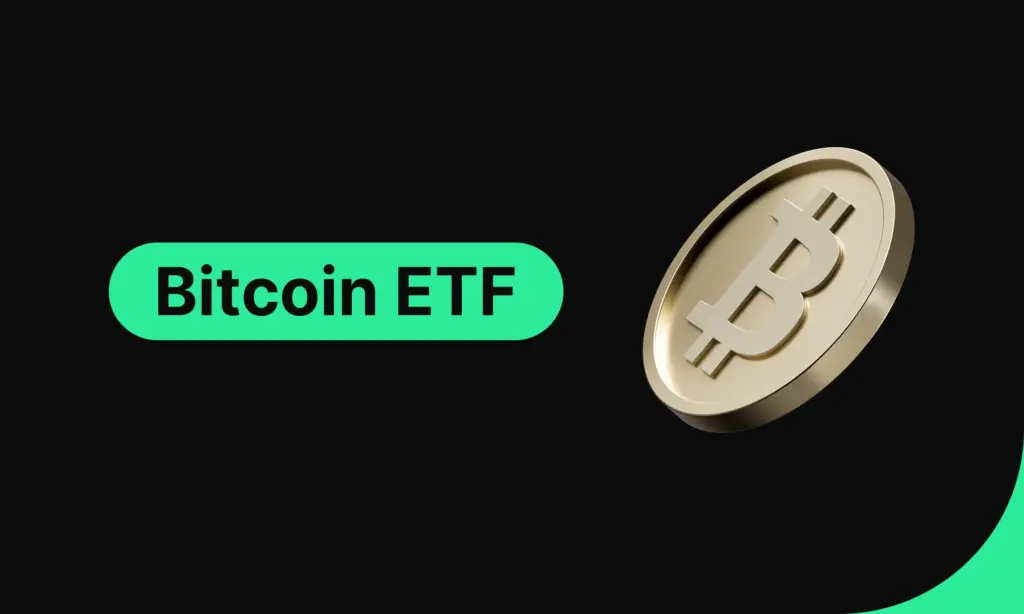The collaboration between Bitcoin ETFs and hedge funds marks a pivotal moment in the evolution of institutional crypto adoption.
- 1 Definition and Structure of Bitcoin ETFs
- 2 What are Hedge Funds?
- 3 Why Hedge Funds are Embracing Bitcoin ETFs
- 4 The Benefits of Combining Bitcoin ETFs and Hedge Funds
- 5 Challenges in Bitcoin ETFs and Hedge Fund Partnerships
- 6 Is The Partnership Between Bitcoin ETFs and Hedge Funds the Perfect Match?
- 7 Conclusion
Definition and Structure of Bitcoin ETFs

A Bitcoin ETF is a financial tool that tracks Bitcoin’s price movements, allowing investors to benefit from the crypto’s success without directly holding it.
These ETFs are traded on traditional stock exchanges, making them a familiar investing option for both institutional and retail investors.
Bitcoin ETFs are basically classified into two types:
Futures-based Bitcoin ETFs: These ETFs invest in Bitcoin futures contracts rather than the crypto itself. Fund managers buy futures contracts and bundle them into the fund, hoping to replicate Bitcoin price swings.
However, futures-based ETFs’ performance may differ from the actual spot price of Bitcoin due to factors such as contango and backwardation in the futures market.
Spot Bitcoin ETFs: Also known as physical Bitcoin ETFs, these funds store actual Bitcoin in secure digital wallets managed by custodians. This structure ensures that the ETF’s value closely tracks the real-time price of Bitcoin, giving investors direct access to the crypto’s market performance.
Benefits of Bitcoin ETFs for Institutional and Retail Investors
Bitcoin ETFs offer various benefits that appeal to a wide range of investors:
- Easier Market Access: Investors can obtain exposure to Bitcoin using their existing brokerage accounts, eliminating the need to navigate crypto exchanges or manage digital wallets.
This streamlines the investment process and lowers the entry barrier for those who are unfamiliar with the technical aspects of crypto.
- Regulatory Oversight: ETFs operate within established regulatory frameworks, providing an extra layer of protection and transparency that direct cryptocurrency investments often lack. This oversight can boost investor confidence and encourage institutional participation.
- No Custody Risks: There are no custody risks when investing in a Bitcoin ETF. The fund’s custodian is in charge of securing the underlying Bitcoin, which reduces the risk of hacking or loss.
Examples of Popular Bitcoin ETFs
Several Bitcoin ETFs have gained popularity, giving investors a variety of options to consider:
The ProShares Bitcoin Strategy ETF (BITO): This is the first Bitcoin-linked ETF in the United States. It invests in Bitcoin futures contracts. It allows investors to gain exposure to Bitcoin price movements without having to hold the cryptocurrency directly.
Grayscale Bitcoin Trust (GBTC): While GBTC is officially a trust rather than an ETF, it acts similarly by providing investors with exposure to Bitcoin via a standard investment vehicle. It holds actual Bitcoin and is a popular solution for people seeking to invest indirectly in the crypto.
iShares Bitcoin Trust ETF: Managed by BlackRock, this ETF has quickly become a market leader with considerable assets under management. It provides investors with exposure to Bitcoin’s price performance via a regulated exchange-traded product.
In essence, Bitcoin ETFs provide a streamlined and regulated mechanism for investors to access the crypto market, combining the innovative nature of digital assets with the familiarity and security of traditional financial instruments.
What are Hedge Funds?
Hedge funds are privately managed investment funds that seek to maximize returns for their investor, who are often high-net-worth individuals (HNWIs), institutions, or accredited investors.
Hedge funds are known for their flexible investment techniques, which are designed to create high returns regardless of market conditions, distinguishing them as unique financial players.
Primary Purpose of Hedge Funds
The primary goal of hedge funds is to generate absolute returns rather than simply outperform a market index. Unlike mutual funds, which frequently try to track or beat benchmarks, hedge funds seek to profit in both bullish and bearish market scenarios.
They accomplish this by utilizing sophisticated investment tactics such as risk hedging through derivatives or short-selling securities.
Diversified Investment Strategies
Hedge funds employ a variety of strategies to generate returns. This includes:
- Equities: Investing in publicly traded equities with the goal of increasing capital.
- Derivatives: The use of options, futures, and swaps to hedge risk or speculate on price movements.
- Alternative Assets: Portfolio diversification by investing in non-traditional assets such as real estate, commodities, or crypto.
Hedge Funds and Digital Asset
One of the most significant recent trends is the integration of digital assets such as Bitcoin and Ethereum in hedge fund portfolios.
This transition has been fueled by the growing acceptance of cryptocurrencies as an emergent asset class with significant returns. Hedge funds are now considering digital assets as:
- A hedge against inflation due to Bitcoin’s capped supply.
- A high-growth investment potential, particularly for blockchain-related projects.
- A way to attract younger, tech-savvy investors seeking exposure to innovative financial products.
Growing Adoption of Crypto by Hedge Funds
The number of hedge funds investing in crypto has increased considerably. According to a recent PwC report, 38% of hedge funds currently hold digital assets, with many aiming to raise their exposure in the coming years.
The increasing regulatory clarity in places such as the United States and Europe has prompted traditional hedge fund managers to investigate crypto.
By combining traditional investment methods with innovative strategies like crypto trading, hedge funds are putting themselves at the forefront of financial innovation, appealing to a wider spectrum of investors.
This trend is consistent with the rising intersection of Bitcoin ETFs and hedge funds, as the two products work together to provide regulated, diversified exposure to the booming crypto industry.
Why Hedge Funds are Embracing Bitcoin ETFs
Bitcoin ETFs have developed as a popular tool for hedge funds seeking exposure to the crypto market without the inherent complexities of directly holding digital assets. Here’s why Bitcoin ETFs are becoming a key component of hedge fund strategies:
Risk Management
Hedge funds prioritize risk management, and Bitcoin ETFs offer a more secure and controlled approach to investing in Bitcoin.
- Reduced Complexity: Unlike holding Bitcoin directly, Bitcoin ETFs do not require private keys, wallets, or custodial services, lowering the risk of hacking or theft.
- Price Tracking Without Ownership: Bitcoin ETFs track Bitcoin’s value without compelling hedge funds to deal with the volatility and operational issues that come with owning the asset.
- Mitigated Exposure: Futures-based ETFs, for example, enable hedge funds to hedge against potential losses by employing futures contracts, offering strategic flexibility.
Regulatory Compliance
Hedge funds operate in a highly regulated environment; therefore, compliance is a crucial factor when adopting new asset classes.
- Clearer Oversight: Bitcoin ETFs are regulated financial instruments, providing a layer of legitimacy and protection that is consistent with hedge funds’ operational requirements.
- Avoiding Direct Crypto regulations: By investing in Bitcoin ETFs rather than Bitcoin, hedge funds avoid the uncertainty of navigating crypto-specific regulations in places where laws are unclear.
- Institutional Acceptance: The SEC’s approval of Bitcoin ETFs, such as the ProShares Bitcoin Strategy ETF, reflects a rising institutional trust in these products.
Liquidity and Accessibility
Bitcoin ETFs are traded on standard stock exchanges, allowing hedge funds to easily integrate with existing systems.
- High Liquidity: Hedge funds benefit from Bitcoin ETFs’ robust liquidity, which allows them to enter or exit positions without causing a major market impact.
- Streamlined Trading: Unlike crypto exchanges, which operate around the clock (24/7), Bitcoin ETFs are traded during regular stock market hours, which is in line with traditional trading practices.
- Custody Simplicity: Bitcoin ETFs eliminate the need for hedge funds to maintain crypto custody solutions, simplifying operations and lowering costs.
Portfolio Diversification
Bitcoin ETFs give hedge funds exposure to a low-correlation asset, which can improve portfolio diversification.
- Hedge Against Inflation: Bitcoin’s finite supply makes it an effective inflation hedge, making Bitcoin ETFs an appealing asset class during times of economic uncertainty.
- Reduced Volatility Impact: By diversifying exposure across various ETF products, hedge funds can lessen their sensitivity to Bitcoin price volatility.
- Broader Exposure: Bitcoin ETFs enable hedge funds to diversify their crypto exposure without fully committing to the market’s complexity.
Hedge funds are increasingly turning to Bitcoin ETFs as a method to enter the fast-developing crypto market. Bitcoin ETFs are ideal for hedge funds’ complex investment methods since they solve issues such as risk management, regulatory compliance, liquidity, and portfolio diversification.
This trend indicates the increasing convergence of traditional finance and crypto, paving the path for larger institutional investment in digital assets.
The Benefits of Combining Bitcoin ETFs and Hedge Funds
The combination of Bitcoin ETFs and hedge funds drives a significant shift in how institutional investors approach crypto markets. Here’s an explanation of why this combination of Bitcoin ETFs and hedge funds provides unique advantages to hedge funds:
- Scalability
Bitcoin ETFs allow hedge funds to deploy significant sums of capital efficiently.
- High liquidity: Bitcoin ETFs trade on standard stock exchanges, allowing hedge funds to scale their investments without affecting market prices.
- No Market Depth Issues: Unlike direct Bitcoin purchases, which could influence crypto exchange rates, Bitcoin ETFs handle large orders seamlessly, resulting in smoother transactions.
- Institutional Infrastructure: ETFs are compatible with existing hedge fund systems, enabling easy integration into diversified portfolios.
- Cost Efficiency
Bitcoin ETFs lower the operational and infrastructural costs that come with direct cryptocurrency investments.
- Simplified Custody: Hedge funds that invest in Bitcoin ETFs avoid the costs and risks associated with handling private keys, wallets, and third-party custody solutions.
- Lower Transaction Costs: Traditional stock exchange trading fees for Bitcoin ETFs are frequently more predictable and cost-effective than crypto exchange fees.
- Regulatory Clarity: Bitcoin ETFs include built-in compliance systems, which reduces the need for additional legal or regulatory costs.
- Strategic Hedging
Bitcoin ETFs offer hedge funds the flexibility they need to control risk and maximize profits.
- Volatility Management: Hedge funds can utilize Bitcoin ETFs to hedge against Bitcoin’s volatility, balancing exposure and reducing possible losses.
- Speculative Trading: Futures-based ETFs enable hedge funds to speculate on Bitcoin price swings without directly holding the asset, providing significant leverage for short-term strategies.
- Macro Hedge: Bitcoin ETFs serve as a hedge against macroeconomic risks such as inflation or devaluation, fitting into hedge funds’ broader risk management frameworks.
- Diversification Without Complexity
Combining Bitcoin ETFs and hedge funds strategies provides access to the crypto market without the operational challenges.
Low Correlation Asset: Bitcoin ETFs diversify portfolios as Bitcoin often trades independently of traditional markets.
Ease of Management: Bitcoin ETFs simplify investing in digital assets, making them accessible to hedge funds without having particular crypto expertise.
Bitcoin ETFs and hedge funds provide a scalable, cost-effective, and systematic approach to crypto investing.
The combination of Bitcoin ETFs and hedge funds enables hedge funds to navigate the evolving landscape of digital assets while remaining true to their return-maximizing goals by simplifying access to the crypto market and providing tools for effective risk management.
This collaboration between Bitcoin ETFs and hedge funds marks a pivotal point in the institutional adoption of crypto.
Challenges in Bitcoin ETFs and Hedge Fund Partnerships
While collaboration between Bitcoin ETFs and hedge funds has many benefits, it also has some challenges. To achieve long-term returns and compliance with global standards, these challenges must be carefully navigated.
Volatility Risks
Despite their organized format, Bitcoin ETFs remain vulnerable to Bitcoin’s inherent volatility.
- Price Fluctuations: Market speculation, macroeconomic events, or regulatory announcements can all cause Bitcoin’s price to fluctuate dramatically. These fluctuations have a direct impact on the value of Bitcoin ETFs, making them a risky asset for hedge funds with low-risk mandates.
- Correlation with Broader Markets: While Bitcoin is commonly regarded as a hedge against traditional markets, amid extreme market events, its price can correlate with global equities, exacerbating overall portfolio risks.
- Impact on Investor Sentiment: High volatility may deter institutional investors that value stability, limiting the potential for growth in these partnerships.
Regulatory Uncertainty
The developing legal and regulatory landscape surrounding Bitcoin ETFs presents challenges for hedge funds.
- Jurisdictional Differences: The acceptance of Bitcoin ETFs varies by country, complicating cross-border investment strategies. For example, while Canada and Europe have legalized Bitcoin ETFs, the United States maintains stringent regulations.
- Delays in Spot Bitcoin ETF Approval: The lack of regulatory approval for spot Bitcoin ETFs in major markets such as the United States restricts investment opportunities and forces hedge funds to rely on futures-based ETFs, which may not be suitable for all investing strategies.
- Compliance Burdens: Hedge funds must navigate a maze of compliance rules when incorporating Bitcoin ETFs into their portfolios, which increases operational complexity and expenses.
Management Fees
The layered fee structure of Bitcoin ETFs and hedge funds can reduce net profits for investors.
- ETF Fees: Bitcoin ETFs often charge expense ratios to cover management and operational costs, which can vary from 0.5% to 1% per year.
- Hedge Fund Fees: Hedge funds commonly use the “2 and 20” fee model, charging 2% of assets under management (AUM) and 20% of earnings.
- Cumulative Effect: When combined, these fees can significantly impact the profitability of Bitcoin ETF investments, especially during periods of poor market performance.
- Investor Pushback: High fees may dissuade investors looking for low-cost exposure to Bitcoin, lowering demand for these partnerships.
While the collaboration between Bitcoin ETFs and hedge funds offers intriguing opportunities, it is not without challenges.
Volatility risks, regulatory uncertainties, and management costs continue to be significant challenges for hedge funds seeking to optimize returns and assure long-term viability.
To navigate the complexities of the evolving crypto investment market, we will need innovative strategies, strong risk management frameworks, and proactive engagement with regulators.
Is The Partnership Between Bitcoin ETFs and Hedge Funds the Perfect Match?
The collaboration between Bitcoin ETFs and hedge funds has sparked tremendous interest in the financial space.
This collaboration of Bitcoin ETFs and hedge funds, which combines crypto innovation with traditional finance, has the potential to redefine institutional investment strategies. But does it really qualify as a “perfect match”? Let’s evaluate.
Synergy in Accessibility
Bitcoin ETFs provide hedge funds with a simplified approach to obtaining exposure to Bitcoin, bridging the gap between crypto markets and traditional finance.
- Ease of Access: Hedge funds can invest in Bitcoin ETFs using existing brokerage accounts, eliminating the need to interact directly with crypto exchanges.
- Institutional-Grade Exposure: Bitcoin ETF regulatory scrutiny ensures credibility and compliance with hedge fund operating guidelines.
- Market Entry for Skeptical Funds: Bitcoin ETFs minimize barriers for traditional hedge funds that are cautious to enter unregulated crypto markets, allowing for calculated exposure to digital assets.
Risk Mitigation and Portfolio Balance of Bitcoin ETFs and Hedge Funds
Bitcoin ETFs provide hedge funds with a regulated way to integrate Bitcoin into their portfolios while avoiding risks associated with direct ownership.
- Reduced Custodial Risks: Hedge funds avoid the complexities of handling wallets and private keys, lowering the risk of asset loss due to human mistakes or cyber-attacks.
- Diversification Benefits: Bitcoin ETFs provide a low-correlation asset to hedge fund portfolios, providing protection from market volatility and inflation.
- Regulated Framework: The compliance framework of Bitcoin ETFs reduces the reputational risks that hedge funds might encounter when engaging directly with less-regulated crypto markets.
Market Impact and Growth Opportunities of Bitcoin ETFs and Hedge Funds
The adoption of Bitcoin ETFs by hedge funds is increasing institutional acceptance of crypto.
- Liquidity Boost: Increased involvement by hedge funds boosts the liquidity of Bitcoin ETFs, which benefits both retail and institutional investors.
- Price Discovery: Institutional engagement through Bitcoin ETFs leads to more accurate Bitcoin price discovery, hence stabilizing the market over time.
- Validation of Crypto Assets: The partnership between Bitcoin ETFs and hedge funds establishes Bitcoin as a legitimate asset class, inviting more investment from conservative institutions.
Perspectives from Industry Experts
Financial analysts and institutional players have expressed their views on the advantages and limitations of this growing trend of Bitcoin ETFs and hedge funds.
- Positive Outlook: Several analysts see Bitcoin ETFs as an effective way for hedge funds to explore crypto markets without direct involvement.
- Cautious Optimism: Some institutional players express worries about Bitcoin’s volatility and regulatory uncertainty, which might jeopardize large-scale adoption.
- Future Expectations: Experts believe that advancements like spot Bitcoin ETFs and enhanced regulations will strengthen the partnership between Bitcoin ETFs and hedge funds, making it even more enticing.
While Bitcoin ETFs and hedge funds have significant synergies, classifying the collaboration as a “perfect match” is dependent on a number of criteria, including risk tolerance, market conditions, and regulatory developments.
For the time being, the collaboration between Bitcoin ETFs and hedge funds is an excellent way for hedge funds to test the waters of crypto, but further innovation and policy clarification will be critical to maintaining and strengthening this relationship.
Conclusion
As the financial environment evolves, Bitcoin ETFs and hedge funds will play a revolutionary role in molding the future of crypto investments.
For investors, institutions, and regulators alike, staying knowledgeable and adaptable will be critical in navigating this exciting new phase in finance.



